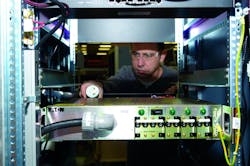National Instruments to assemble open-architecture avionics test and measurement stations for Air Force
ROBINS AIR FORCE BASE, Ga. – U.S. Air Force electronics experts needed a company to assemble a field- and depot-level avionics test and measurement system. They found their solution from National Instruments Corp., Austin, Texas.
Officials of the Air Force Sustainment Center at Robins Air Force Base, Ga., announced a $19.2 million five-year contract to National Instruments on Monday to provide kits to assemble the Versatile Diagnostic Automatic Test Station (VDATS).
VDATS is the Air Force member of the U.S. military families-of-testers, and is the Air Force's directed and preferred automatic test solution for avionics.
National Instruments joins Ametek Programmable Power Inc. in San Diego; Rohde & Schwarz USA Inc. in Columbia, Md.; Teradyne Inc. in North Reading, Mass.; and Keysight Technologies Inc. in Colorado Springs, Colo., in assembling VDATS test stations. TFAB Defense Systems LLC in Warner Robins, Ga., also is maintaining, upgrading, and assembling VDATS systems.
The VDATS station has a modular open-architecture design and is adaptable to most electronic test and measurement needs. It was designed originally for depot testing capabilities, but is suitable for intermediate-level testing under controlled conditions.
Today test and measurement experts at the Warner Robins Air Logistics Complex (WR-ALC) at Tobyhanna Army Depot, Pa., build the VDATS organically.
The tester comes in two core configurations: the digital analog (DA)-1 that handles most analog and light digital requirements; and the DA-2 station for enhanced digital testing for advanced avionics testing. It also has a radio-frequency roll-up assembly for standard RF test capability.
VDATS supports the avionics and other electronics for the A-10, B-1, B-2, B-52, C-5, C-17, C-130, E-3, E-8C, F-15, F-16, F-22, H-53, H-60, UH-1, and KC-135 aircraft; the MC-4 and MQ-9 unmanned aerial vehicles (UAVs); and Navy ships.
The VDATS design enables modular capability enhancements through mission equipment support sets (MESS) for small applications or roll-up bays for larger applications that are portable.
This preserves the configuration stability of the station while providing flexibility to adapt to a wide variety of workload requirements, which also reduces the proliferation of unique test stations, experts say.
On this contract National Instruments will do the work in Austin, Texas, and should be finished by 2026. For more information contact National Instruments online at www.ni.com, or the Air Force Sustainment Center at www.afsc.af.mil.
About the Author
John Keller
Editor-in-Chief
John Keller is the Editor-in-Chief, Military & Aerospace Electronics Magazine--provides extensive coverage and analysis of enabling electronics and optoelectronic technologies in military, space and commercial aviation applications. John has been a member of the Military & Aerospace Electronics staff since 1989 and chief editor since 1995.
